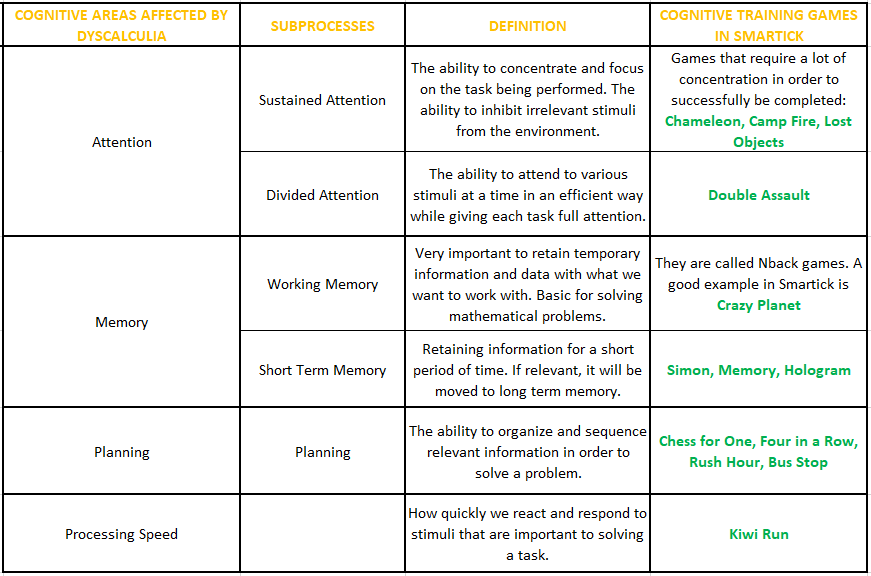
At Smartick we have opted to offer math activities and cognitive training games to complement and optimize the math learning experience for children, including those with learning difficulties. In this post, we will talk specifically about dyscalculia, as it is one of the learning disabilities that specifically relates to mathematics.
Cognitive Areas Most Affected in Children with Dyscalculia
- Sustained and divided attention.
- Working memory and short-term memory.
- Ability to plan or name.
- Processing speed.
When these areas are not functioning properly they produce substantial learning difficulties that must be improved through training.

Most Common Symptoms in Primary School-Aged Children Who Have Dyscalculia
- Inability to remember strategies needed to solve a math problem, such as subtraction or addition with carrying.
- Unable to recognize words such as ”greater than” or ”less than.”
- Difficulties when learning and remembering a process or rules for solving basic math problems. When they read a problem with various pieces of information, they find it difficult to remember the information and determine what number is greater than the other. They may skip steps and not fully understand the problem that they are solving.
- Symbols are difficult. For example, they confuse the symbols + and -, and cannot use these or other symbols correctly.
- Directionality: They begin solving problems in the wrong order. For example, solving addition and subtraction problems from the right instead of from the left. They also have difficulties when changing the orientation of the problems. Such as moving from horizontal addition to vertical, and the greater than and less than symbols > <.
- They may also show difficulties with aligning features. Children with dyscalculia find multiplication problems difficult when aligning the columns of the product in the corresponding columns. When dividing, they write the first number of the quotient to the right and then continue writing the rest of the numbers in the result to the left.
- Little mechanical memory dexterity: they are unable to memorize and remember multiplication tables or other topics that have various digits, such as a phone number.
- Difficulties in performing any basic mental calculation.
- They do not understand word problems and do not visualize or represent the problem in a global way. They are unable to properly remember the information given in the word problem. Also, visual representations, like drawings, can be problematic.
- Relative symptoms of understanding and reasoning in problems: they do not know how to differentiate relevant from nonrelevant data or when problems need more than one step to be solved.
Other Difficulties Related to Dyscalculia
People with dyscalculia can simultaneously present other symptoms that can be linked to other diagnoses, such as:
- Executive functioning issues: Executive functions are important skills that can affect learning. These include memory, flexibility, planning, and attention. Deficiencies in these areas can make math difficult. Such as performing tasks in a hurry, and not easily incorporating new rules due to the lack of flexibility and acting automatically and rigidly. Other setbacks can be losing some of the information from the problem due to short term memory difficulties or not noticing their own mistakes.
- ADHD: Symptoms of dyscalculia and ADHD often co-exist. This is mostly because of the lack of attention to detail, which leads to them making mistakes while solving math problems.
- Emotional blockage due to the anxiety they acquire when they anticipate failure on math tests.
Smartick’s activities during daily sessions, combined with competitions and games in the Virtual World, are especially suitable for stimulating and training skills in a personalized way, adapted to the needs of each child.
Learn More:
- Dyscalculia: What It Is, Causes and Treatments
- The Role of Working Memory in Learning Mathematics
- What is Dyscalculia and How Can It Be Treated
- Greater Than and Less Than Symbols
- Math Symbols: Greater Than, Less Than, and Equal
- Master Math! 10 Reasons to Help Your Child do Just That - 05/28/2020
- Why Do Children Believe That Things Happen? - 05/25/2020
- Is Self-Control Linked to Health? - 05/19/2020







